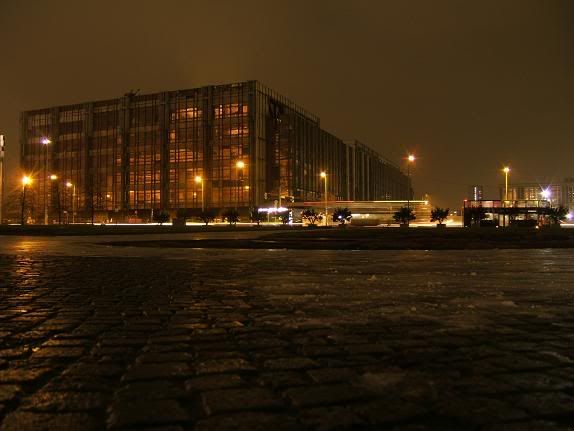Friday, January 13, 2006
A Man's Home Is His Palast
Germany's history and identity is difficult. Some want to draw a line under everything, others want to focus on the golden years and derive some kind of identity out of that. Some would argue that Germany as we know it has only existed since 1990. Re-generating Berlin is not therefore simply a case of getting funding and getting a plan passed by an indifferent town-planning pannel. Every decision taken is a decision on 'how to deal with a problematic history'. But the decision to demolish Palast der Republik has cut right to the very depths of the East/West divide in Berlin.
Palast der Republik is in the former Eastern sector and was the East German parliament building from 1976 until the GDR's demise in 1989. But it wasn't just a parliament building - it was the people's palace, based on the notion that a republic is of the people - and so was a social and cultural centre for the GDR's citizens, where state run cultural activities, theatres and restaurants were situated. Regardless of the former GDR's citizens' feelings towards the oppressive government and secret police, fond memories are held by many East Germans of visits to the capital city to see the iconic symbols of the system to which their work and lives were officially concerned. It doesn't fit the idealised image of how a European Tourist City should look - streets after streets of ye olde granduer and backstreets of ye olde twee and cobbles. That's part of Berlin's history, but not the history as known by the people who have lived in the capital for the last 60 years.
The planned replacement is a reconstruction of Berliner Stadtschloss, an old castle which stood in the same position until it was destroyed in World War II. The Castle would be a shopping mall - presumably of the expensive variety, in keeping with the already-gentrified area surrounding it, designed to keep the tourists spending and the German economy afloat (Berlin was almost declared bankrupt two years ago). The trouble with such a plan is that it excludes and alienates the residents of East Berlin/Germany, who have felt excluded and alienated enough already by the institutional and cultural changes (dissertation topic ahoy!) and this blatant brushing-under of half the city's history has really got the goats of a lot of people.
Sadly, demolition has already begun and the Palast is no longer open for exhibitions and the like. At least the TV tower will always be a big fallic memorial to the days and dreams of state-socialism, even if the execution thereof was much grayer and grimmer than the dream.